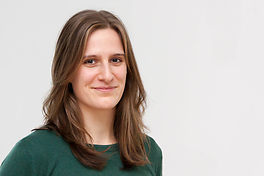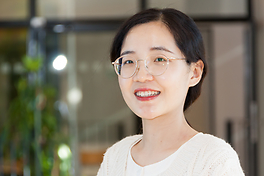November 18, 2020 | News | Interview
New PhD Students Welcomed to the MPIDR

New PhD students at MPIDR: Esther Denecke, Chia-Jung Tsai, Su Yeon Jang, Marina Kolobova and Xinyi Zhao.
© MPIDR/Wilhelm
In October and November five women started their research projects at the MPIDR in Rostock. They work in fields like statistics, migration and population health.

© MPIDR/Wilhelm
Esther Denecke
1) What question drives you most in your research?
As a trained statistician I love working with data. I am especially fascinated by the unique characteristics of different data sets and the possibilities they offer. As such, I am currently interested in combining different data sources to tackle research questions surrounding migration.
2) What are you particularly looking forward to as you start working at MPIDR?
At MPIDR I am looking forward to working in a highly interdisciplinary team and a stimulating research environment. Moreover, working in the Digital and Computational Demography Lab, I am excited to explore and work with novel data sources such as social media data.
3) What do you like most about Rostock?
The water. Having spent several years of my life with sprint kayaking, I like being close to water.
4) What are you obsessed with at the moment besides demography?
I enjoy outdoor activities such as running and biking though on rainy days I prefer literature and cooking.

© MPIDR/Wilhelm
Xinyi Zhao
1) What question drives you most in your research?
Due to my background in Geography, I originally treated migration as a simple type of geographic relocation and only considered the spatial factors at the macro level. However, as going deep into this topic, more and more questions behind migration emerged in my mind. I want to investigate what drives different individuals to move, how migration affects peoples’ lives, how different the migration patterns are with respect to people with diverse backgrounds, status or personalities, and much mor. I want to make use of my major in Geography and Geographic Information System (GIS) to address these questions on migration in a demographical and sociological way, to explain the mobility of population from manifold perspectives.
2) What are you particularly looking forward to as you start working at MPIDR?
It’s inspiring that colleagues with different academic backgrounds gathered here in Rostock, focusing on demographic research. I am eager to evolve by getting to know multiple areas, as well as share my experience in GIS. I also hope that GIS can play a role in our interdisciplinary research.
3) What do you like most about Rostock?
The first impression of Rostock totally met the expectation of a Hanseatic City I had in my mind. After a 12 hours’ flight coming from another harbor city, I perceived a distinct urban scenery, especially shaped by its Gothic architecture. After living here for around two weeks, I quite enjoy the pace of life which is not that fast, giving me a sense of inner calm.
4) What are you obsessed with at the moment besides demography?
I enjoy traveling. Instead of visiting famous attractions, I prefer walking the small roads, stroll along the markets and tasting local food to experience the real local life. When I prefer to stay at home, I am into building Lego or painting.

© MPIDR/Wilhelm
Su Yeon Jang
1) What question drives you most in your research?
Ever since I have jumped into health research, I have always been fascinated by the development of diseases and its burden to society. My background as a nurse gave me perspectives in the healthcare of people at different stages of life. At the moment, I am trying to determine the impact of life-course experience on the development of diseases and later-life health outcomes among the underrepresented populations, with a focus on the migrant population. Particularly, during my doctoral studies, I aim to explore the multimorbidity and mortality in immigrants from different regions around the world.
2) What are you particularly looking forward to as you start working at MPIDR?
What is really exciting for me at MPIDR is that it has such a multidisciplinary environment, with many researchers working in various fields. Especially during the first month at MPIDR, I saw how actively discussions were held and how each one of the members was excited about their research topics. I really look forward to being a part of the institute.
3) What do you like most about Rostock?
I did my master’s in Freiburg, a city in the Southern part of Germany, but this is actually my first time ever up in the North. Although there are some common characteristics between the two cities (even though there’s an 8-hour travelling distance), one particular thing about Rostock is that it has a river and is very close to the Baltic Sea. I haven’t been to the sea yet, but it is always nice to have the seafood section in every supermarket you go to!
4) What are you obsessed with at the moment besides demography?
Before the pandemic, I used to go to cinemas to watch the newest films. This is probably the influence of my dad, who is a documentary director for broadcast programs and films. As I was growing up, it was one of the weekend routines for my family to go to the movies. Although I can’t go to the cinemas as I used to during the “normal” times, I still spend most of my free time watching a lot of films and series online. It is also a good way to connect with my family back home because from time to time, we select a film together and hit the play button at the same time while on the phone.
Marina Kolobova
1) What question drives you most in your research?
I study spatial differences in mortality. My PhD project is devoted to the mortality and health differences across regions of Germany. Despite the reduction of inequality in mortality across regions in the last decades, regional differences in Germany are still observed. The question that drives me the most at the moment is what determinants are responsible for the persistent spatial inequalities.
2) What are you particularly looking forward to as you start working at MPIDR?
During the last year I was employed at the Max Planck Institute for Demographic Research as a Student Assistant. Over this time, I became acquainted with the Institute and appreciate its research community and very friendly environment. I am very excited about the opportunity to learn demography from the experts. The Max Planck Institute for Demographic Research is for sure one of the best places to pursue a PhD in Demography.
3) What do you like most about Rostock?
I have spent the last years in Rostock while studying for the Master's degree in Demography at the University of Rostock. I love this city and I am very happy to stay in Rostock for my PhD years. I like the old town, parks and forests, and the Baltic Sea.
4) What are you obsessed with at the moment besides demography?
Besides demography and social science in general, I am interested in the philosophy of science and history.

© Chia-Jung Tsai
Chia-Jung Tsai
1) What question drives you most in your research?
The question driving me the most at the moment is the existing data gap in current migration research. I would like to explore innovative data sources to answer questions that cannot be resolved by conventional data in social science. As a Ph.D student, I would like to analyze attitudes and reaction towards migrants through online data sources like social media and online experiments.
2) What are you particularly looking forward to as you start working at MPIDR?
I am really looking forward to learning from scientists with different backgrounds and working in an interdisciplinary team. In addition, I am looking forward to the courses and overseas exchange opportunities offered by IMPRS-PHDS.
3) What do you like most about Rostock?
It is my first time living somewhere so close to the sea. It takes only 30 minutes by S-Bahn from the city center to the beach. I enjoy it a lot!
4) What are you obsessed with at the moment besides demography?
I like to cook and to learn about different cultures. I am particularly interested in the Japanese culture, literature and Anime. Besides, I also try to learn German, and I hope to master it one day.